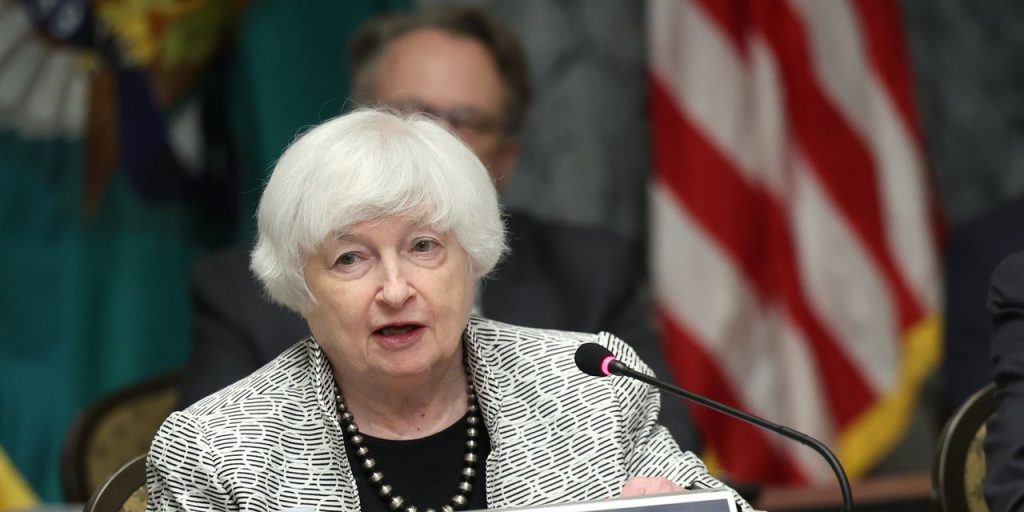Fitch Ratings late Tuesday made good on recent concerns about the U.S. credit profile and downgraded its rating on the nation’s debt one notch to AA+ from AAA, saying that it reflects “expected fiscal deterioration,” a “high and growing” government debt burden and an “erosion of governance” in face of repeated debt-limit standoffs and other ills.
Tuesday’s ratings downgrade was the first for the U.S. sovereign debt since S&P’s Global Ratings took the same step in 2011, bringing its rating to AA+ from AAA also amid a debt-ceiling standoff at the time. Moody’s Investors Service has kept its U.S. credit rating at Aaa, its highest.
The “Big Three” debt ratings agencies assess the creditworthiness of countless entities, from companies and cities; school boards to states and countries. Generally speaking, the highest the rating, the least risky the borrower is deemed, and it costs less for them to borrow money.
Read also: $25 trillion Treasury market is in the spotlight as U.S. loses its AAA rating for a second time
The past 20 years have witnessed a “a steady deterioration in standards of governance” in the U.S., the debt-ceiling agreement notwithstanding, Fitch said Tuesday.
“The repeated debt-limit political standoffs and last-minute resolutions have eroded confidence in fiscal management,” it said. “Several economic shocks” as well as tax cuts and new spending initiatives “have contributed to successive debt increases over the last decade.”
Moreover, the U.S. has had “limited progress” in tackling medium-term challenges related to rising social security and Medicare costs due to an aging population, the debt agency said. Fitch said it expects general-government deficit to rise to 6.3% of the U.S.’s gross domestic product this year, from 3.7% in 2022.
Reaction from the White House was swift, with press secretary Karine Jean-Pierre saying, “it defies reality to downgrade the United States at a moment when President Biden has delivered the strongest recovery of any major economy in the world.” She also called “extremism by Republican officials,” including those earlier “cheerleading default,” a threat to the economy.
Treasury Secretary Janet Yellen said the downgrade was “arbitrary and based on outdated data,” in a statement Tuesday. She also said the decision “does not change what Americans, investors, and people all around the world already know: that Treasury securities remain the world’s preeminent safe and liquid asset, and that the American economy is fundamentally strong.”
Fitch said that “tighter” credit, weakening investment in business, and a “slowdown” in consumption “will push the U.S. economy into a mild recession” in the fourth quarter of this year and the first three months of next year. It also called for GDP growth slowing to 1.2% this year, from 2.1% in 2022, and overall growth of just 0.5% in 2024.
On a brighter note and supporting the new AA+ rating, Fitch said that “exceptional strengths” in the U.S. include a well-diversified, high-income economy supported by a “dynamic” business environment. And, critically, the U.S. dollar
DXY,
still reigns as the world’s “preeminent reserve currency,” which gives the government financing flexibility.
Stock-market investors weren’t fazed by the warning back in June, but it remains to be seen how they will react when the market opens on Wednesday. The Dow Jones Industrial Average
DJIA,
advanced 0.2% on Tuesday, while the S&P 500 index
SPX,
lost 0.3%.
Stock futures
YM00,
ES00,
fell slightly, after the Fitch report and a third indictment against former President Donald Trump landed at about the same time late Tuesday.
In a statement, Senate Majority Leader Chuck Schumer, D-N.Y., said the Fitch downgrade reflects “reckless brinksmanship and flirtation with default” by House Republicans and that they “must never push our country to the brink of default again.”
Louisiana’s Republican Gov. Bobby Jindal tweeted: “S&P downgraded US credit under Obama, and now Fitch has downgraded US rating under Biden. The excessive spending and borrowing must stop.”
U.S. borrowing costs have been climbing in recent months as the Treasury pays higher yields to issue bills to restock its coffers.
The Treasury has unleashed a flood of Treasury issuance since its June debt-ceiling deal. The 1-month Treasury yield
TMUBMUSD01M,
was at 5.36% on Tuesday, while auctions of other Treasury bills maturing in one year often kick off yields north of 5%.
See: ‘Eye-popping’ $1 trillion third-quarter borrowing need from U.S. Treasury raises risk of buyers’ fatigue
Investors also have been focused on earnings season that’s in full swing, and some of the largest U.S. companies are slated to report their financial snapshot this week, including Amazon.com Inc.
AMZN,
and Apple Inc.
AAPL,
–Joy Wiltermuth contributed reporting
Read the full article here














